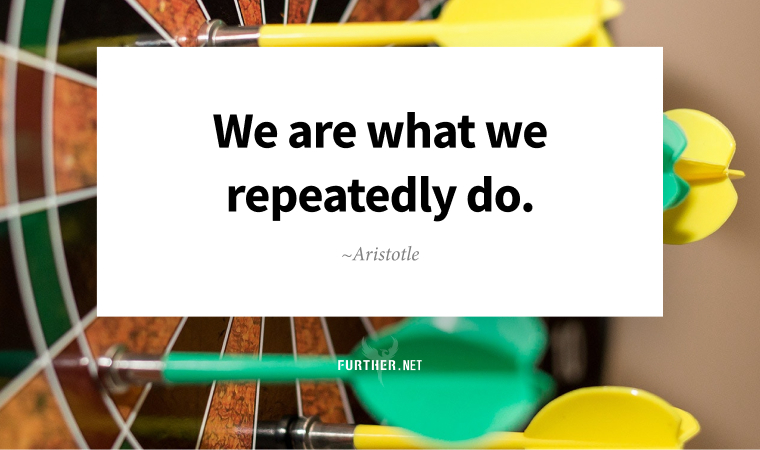
We have met the enemy, and it is us.
More specifically, the enemy of your desire for midlife reinvention is your self. It’s the voice in your head that says you’re already one thing, and you have no business trying to be something else.
Your thoughts say you’re being ridiculous. That you’re a fraud. An imposter.
But in reality, it’s the voice in your head that’s the imposter. Your thoughts convince you that they are the author of who you are and what you can do, but the truth is … well, that isn’t true:
According to modern neuroscience, the self is less a thing than it is a process. In the process of selfing, the mind links together separate moments of subjectivity to give us the impression that we are a coherent, enduring entity.
Neuroscience merely confirms what Eastern philosophical traditions have known for millennia. And while Buddha never said there is no self, he did advocate against the “selfing” that leads to human suffering:
[Buddha] focused on the karma of selfing. Because clinging lies at the heart of suffering, and because there’s clinging in each sense of self, he advised using the perception of not-self as a strategy to dismantle that clinging.
Your “self” is highly invested in clinging to its current identity. Even though it may embrace a chaotic storm of emotional turmoil and reactive anger when threatened or slighted, the self doesn’t like changes to its fundamental character.
That makes sense. After all, in order for the self to perpetuate the illusion of its existence, it must tell a consistent story over time. Big changes threaten that narrative, and therefore thoughts arise to maintain the status quo.
So, what to do? First of all, accept that you are not the thoughts in your head. You can’t be, because your thoughts arrive out of nowhere, often unbidden and involuntary. Thoughts are often just something that happen to you.
Contrast these random thought bubbles with the act of doing something with focus. When your attention is focused on doing, your thoughts are clearly not in charge … to the extent you notice them at all.
When we’re not explicitly thinking about ourselves, our sense of self vanishes and our mind-body continues to function just as well without it.
When we’re in the purest form of doing, it’s called a flow state. Flow happens when you become fully immersed in an activity. While flow is an amazing experience, you’re often so engrossed that you don’t consciously realize you’re having an experience.
You just act. There is no try, and there is no “self” telling you what to do — you just do it. In these moments, this is who you really are.
Psychologically speaking, imposter syndrome is real. It’s often tied to conditions where self-esteem is low. But it’s more accurate to say that you suffer from imposter syndrome when you regard your illusory self narrative too highly.
The way to become the next version of yourself is to do what the person you want to be consistently does. That’s challenging in itself, so you certainly don’t need the voice in your head getting in the way of taking consistent action.
At this point, it helps to expand on Aristotle’s quote from above:
We are what repeatedly do. Excellence, therefore, is not an act but a habit.
Down below, Trudi has a habit you should develop if you want to live longer … and surprisingly it’s reading.
Keep going-

The Wellness Shysters
If you’re into the kind of wellness nonsense peddled by Gwyneth Paltrow and Goop, you’re likely in the wrong place. But if you’re not, rejoice — the tide is turning against the wellness shysters.
Scanners
I’ve recently started training in the martial art Aikido, and we do a body scan meditation before every class. You get quickly centered by simply bringing awareness to different parts of the body through focus and concentration.
How To Release Stress and Tension With A Simple Body Scan Meditation
Good Meta
Facebook renamed to Meta is still bad, but metacognition can be very good. It’s often defined as “thinking about thinking.” Or better still, the thoughts you have about your own thought process.
How to Use Metacognition Skills to Become More Self-Aware
The Perfect Fail
Perfectionism is one of the main obstacles to forming habits. Our hopeful idea of how things will go — and then our disappointment and frustration with ourselves when it doesn’t go that way — ends up derailing us.
Why Perfectionism Stops Us from Creating New Habits
Read More, Live Longer

By Trudi Roth
Our new Further community, Well + Wealthy, may have launched with a fitness challenge, but I’ve been reading between the lines: we have a lot of bookworms in the house.
This is good news for many reasons, not just because reading sets you up for success by expanding your knowledge, intelligence, and critical thinking skills. That’s all part of the explicit function of books, but science shows the act of reading itself has profound positive psychological, emotional, and physical impacts, too.
Just in the nick of time — Pew Research reports only 17% of teens read for fun (around half as many as when we were kids in the mid-80s). Adults are also reading less: Pew reports Americans ages 50+ are more likely than their younger counterparts to be non-book readers.
So, if you’re already a devoted reader, congrats — your bookish ways are validated. But if you live on a diet of podcasts, bingeable shows, and doomscrolling, consider cracking a book.
This is Your Brain on Books
Nowadays, offsetting the effects of our daily activities with the ancient practice of reading is more essential than ever before.
Most modern hobbies psychologically damage us. Social media, for example, wastes our time, feeds us misinformation, and increases our risk of depression. Yet there’s a reason we keep returning to it: it provides short, sharp entertainment without requiring much effort or concentration.
When you bury your nose in a book, you automatically get the antidote to our driven-to-distraction world. MRI-backed research shows reading helps strengthen brain connectivity, lightening up crucial networks beyond the period of time when you’re reading. And research shows lifelong readers have a 32% decreased risk of dementia.
Best of all, there’s a survival advantage of reading books: a long-term study found that people who read three and a half or more hours a week were 23% more likely to live longer.
So, if it feels like reading is a lifesaver, that’s because it is.
Read to Become a Better Person
It’s true: psychologist David Comer Kidd found that fiction enthusiasts are more empathetic. They’re also less stressed, anxious, and depressed, and enjoy better rest. And long-term readers who are privy to fictional characters’ minds become better able to understand others’ thoughts, desires, and beliefs in real life — what psychologists call “a theory of mind.”
This is perhaps why the therapeutic field of bibliotherapy has become increasingly popular. A bibliotherapist helps you work through emotional issues, clarify goals, and solve problems using genres from fiction to memoir, self-help, and philosophy. This approach improves self-esteem, self-awareness, and self-efficacy, which, in turn, helps you be more present, patient, and loving.
So, if you’ve always enjoyed reading but don’t make the time, or even if reading’s not your jam, now’s the perfect time to turn the page.
The Psychological Benefits of Reading (Medium)
further: flashback
 Outkast – Hey Ya!
Outkast – Hey Ya!Speakerboxxx/The Love Below, 2003
It’s not often that we stray into the 21st century for the Flashback, but we’ll make an exception for Hey Ya! After all, it’s not like Gen Xer Andre 3000 expected Millennial ladies to understand what he meant by “Shake it like a Polaroid picture.” (YouTube)
further: sharing

|
Share Further with Friends and
Get Access to Well + Wealthy! Share Further with friends and earn access to our new membership community: Well + Wealthy. Simply give them your unique referral link or use one of the sharing icons below.
You have referred {{subscriber.rh_totref}} people so far.
|
{% endif %}
Once you share your link and refer subscribers to Further, this is how you claim your $MOVE:
- First create a Rally.io account here (if you already have a Rally account you can skip to step 2)
- Once your account is created please locate your Rally Network Id, which can be found by clicking the profile icon on the top right of the Rally platform (see here).
- Next, enter the email address you subscribe to Further with along with your Rally Network ID into this form.
- We’ll now be able to send you $5 USD worth of $MOVE coin for every subscriber you send to Further!
Thank you for sharing Further!
Further subscribers earn $MOVE coin by sharing Further with friends to gain access to our exclusive membership community Well + Wealthy. Get your own free weekly dose of health, wealth, travel, and happiness advice here, and find out all the details on our referral program.
Thank you for sharing Further!





